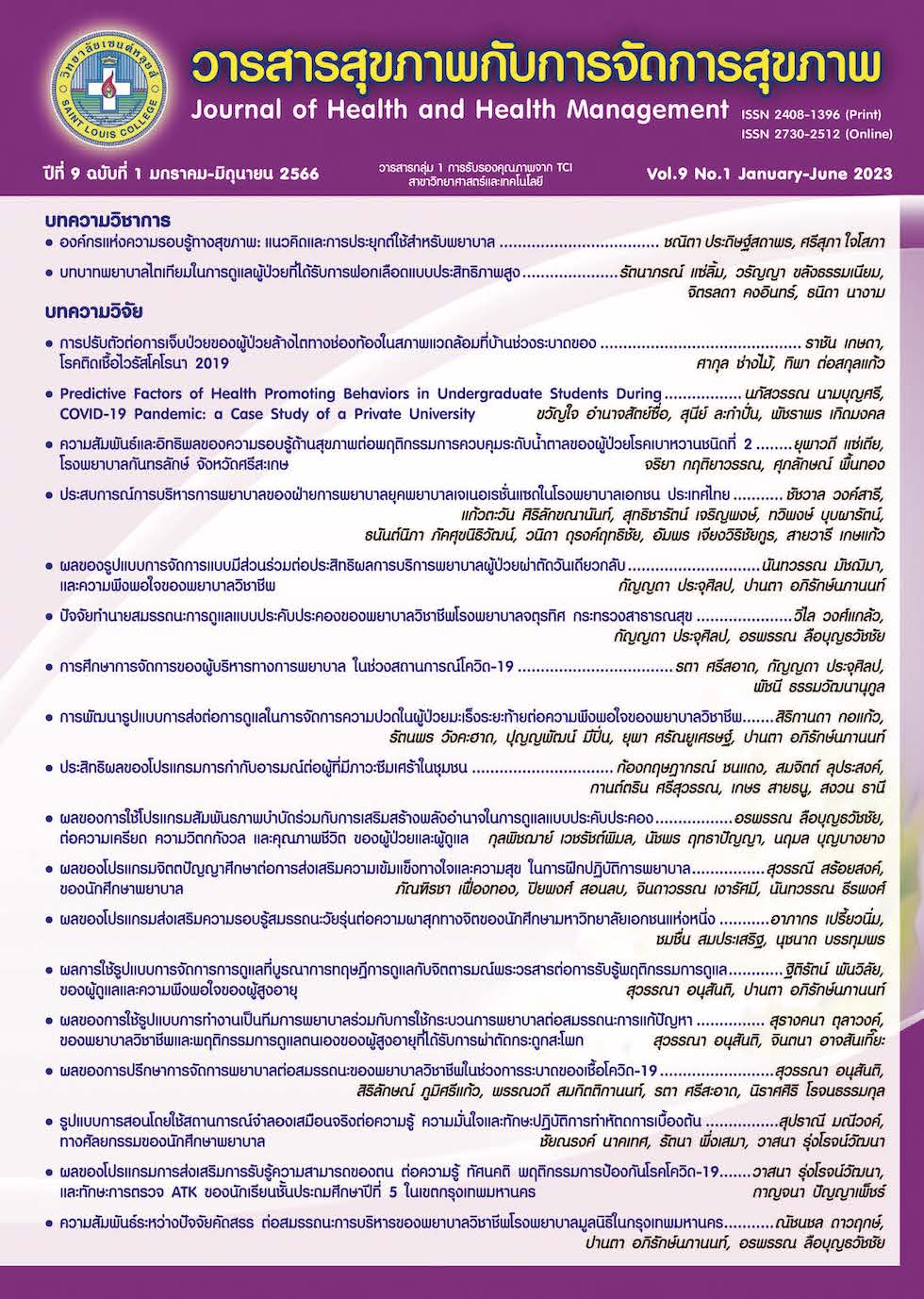The Effects of Adolescent Literacy Promoting Program on the Psychological Well-Being of Students at a Private University
Keywords:
Adolescents, Adolescent Literacy Program, Psychological Well-BeingAbstract
This study was a quasi-experimental study to the effect of adolescent literacy promotion program on the psychological well-being of students at a private university. The experimental group consisted of 32 students in a private university and the control group consisted of 31 students who studied and lived normally at a private university. The experimental period was 6 weeks. Data collection was done using the psychological well-being scale with a reliability of .95. Data were analyzed using descriptive statistic, independent t-test statistics, dependent t-type statistics. and statistical analysis of covariance (ANCOVA) when the pre-experiment psychological well-being score was a covariate. The level of statistically significance was set at the .05 level. The results showed that 1) After the experiment, the psychological well-being score of the experimental group was higher than before. 2) When the mean of pretest psychological well-being score was calculated as the covariate to predict the psychological well-being score, it was found that the experimental group had a higher mean psychological well-being score than the control group by the difference of the mean post-experimental psychological well-being score of the experimental group and the control group were statistically significant difference. 3) 19.7 % of those who participated in the adolescent literacy program had higher psychological well-being scores than those who studied and normal activity. The results of this study, it shows that this adolescent literacy promotion program can be applied in universities according to the actual situation or the context of each institution
References
นงเยาว์ อรุณศิริวงศ์. (2557). การพัฒนาคุณภาพชีวิต. กรุงเทพฯ: มหาวิทยาลัยสุโขทัยธรรมาธิราช.
เบญจวรรณ ถนอมชยธวัช, ผ่องศรี วาณิชย์ศุภวงศ์, วุฒิชัย เนียมเทศ, และณัฐวิทย์ พจนตันติ (2559). ทักษะแห่งศตวรรษที่ 21: ความท้าทายในการพัฒนานักศึกษา. วารสารเครือข่ายวิทยาลัยพยาบาลและการสาธารณสุขภาคใต้, 3(2), 208-222.
ภมรพรรณ์ ยุระยาตร์. (2554). การศึกษาและพัฒนาความผาสุกทางจิตใจของนิสิตนักศึกษาในมหาวิทยาลัย.(ปริญญาการศึกษาดุษฎีบัณฑิต). มหาวิทยาลัยศรีนครินทรวิโรฒ, กรุงเทพ.
อธิพัชร์ ดาดี (2564). กิจการนักศึกษาในศตวรรษที่ 21. วารสารรัชตภาคย์, 15(43), 389-396.
อาภากร เปรี้ยวนิ่ม, พูลพงศ์ สุขสว่าง, และปิยะทิพย์ ประดุจพรม. (2563). การพัฒนามาตรวัดความผาสุกทางจิต. วารสารพยาบาล, 69(2), 30-36.
อาภากร เปรี้ยวนิ่ม, พูลพงศ์ สุขสว่าง, และปิยะทิพย์ ประดุจพรม. (2565). การพัฒนาวิธีการประมาณค่าความเที่ยงของสัมประสิทธิ์แอลฟาแบ่งชั้นแบบใหม่ สำหรับมาตรวัดพหุมิติ. วารสารศึกษาศาสตร์ มหาวิทยาลัยนเรศวร, 24(2), 316-331.
Abbott, R. A., Ploubidis, G. B., Huppert, F. A., Kuh, D., Wadsworth, M. E., & Croudace, T. J. (2006). Psychometric evaluation and predictive validity of Ryff's psychological well-being items in a UK birth cohort sample of women. Health and quality of life outcomes, 4(76), 1-16.
Alvarado, G., Skinner, M., Plaut, D., Moss, C., Kapungu, C., & Reavley, N. (2017). A systematic review of positive youth development programs in low-and middle-income countries. Washington, DC: Youth Power Learning, Making Cents International.
Fava, G. A., Cosci, F., Guidi, J., & Tomba, E. (2017). Well‐being therapy in depression: New insights into the role of psychological well‐being in the clinical process. Depression and anxiety, 34(9), 801-808.
Fiedler, S., Pfaff, H., Soellner, R., & Pförtner, T. K. (2018). Exploring the association between health literacy and psychological well-being among industry managers in Germany. Journal of Occupational and Environmental Medicine, 60(8), 743-753.
George, D., & Mallery, P. (2003). SPSS for Windows Step by Step: A Simple Guide and Reference. 11.0 Update (4th ed.). Boston: Allyn & Bacon.
Grove, S. K., Burns, N. & Gray, J. (2017). Burns and Grove's the practice of nursing research: appraisal, synthesis, and generation of evidence (8th ed). New York: Elsevier.
Hellfeldt, K., López-Romero, L., & Andershed, H. (2020). Cyberbullying and psychological well-being in young adolescence: the potential protective mediation effects of social support from family, friends, and teachers. International journal of environmental research and public health, 17(1), 45-60.
Hird, S. (2003). What is well-being? A brief review of current literature and concepts. Scotland: Glasgow.
Lehtimaki, S., Schwalbe, N., & Solis, L. (2018). Adolescent health: the missing population in universal health coverage. Europe: World Health Organization.
Lerner, R. M., Lerner, J. V., Murry, V. M., Smith, E. P., Bowers, E. P., Geldhof, G. J., & Buckingham, M. H. (2021). Positive youth development in 2020: Theory, research, programs, and the promotion of social justice. Journal of Research on Adolescence, 31(4), 1114-1134.
Parhiala, P., Torppa, M., Vasalampi, K., Eklund, K., Poikkeus, A. M., & Aro, T. (2018). Profiles of school motivation and emotional well-being among adolescents: Associations with math and reading performance. Learning and Individual Differences, 61, 196-204.
Park, A., Eckert, T. L., Zaso, M. J., Scott‐Sheldon, L. A., Vanable, P. A., Carey, K. B., Ewart, C. K. & Carey, M. P. (2017). Associations between health literacy and health behaviors among urban high school students. Journal of School Health, 87(12), 885-893.
Pyle, E., & Manclossi, S. (2018). Understanding well-being inequalities: Who has the poorest personal well-being. London, UK: Office for National Statistics.
Rieckmann, M. (2017). Education for sustainable development goals: Learning objectives. France: UNESCO Publishing.
Ryff, C. D. & Keyes, C. L. M. (1995). The structure of psychological well-being revisited. Journal of Personality and Social Psychology, 69(4), 719-727.
Sagone, E., & De Caroli, M. E. (2014). Relationships between psychological well-being and resilience in middle and late adolescents. Procedia-Social and Behavioral Sciences, 141(1), 881-887.
Trudel-Fitzgerald, C., Millstein, R. A., von Hippel, C., Howe, C. J., Tomasso, L. P., Wagner, G. R., & VanderWeele, T. J. (2019). Psychological well-being as part of the public health debate? Insight into dimensions, interventions, and policy. BMC public health, 19(1), 1-11.
Wigfield, A .& Cambria, J. (2010). Students' achievement values, goal orientations, and interest: Definitions, development, and relations to achievement outcomes. Developmental Review, 30(1), 1-35
Şahin, İ. R. E. M., Togay, A. H. M. E. T., & Kırlangıç Şimşek, B. (2020). The effectiveness of psychodrama on social skills and life satisfaction of disadvantaged early-adolescents. Zeitschrift für Psychodrama und Soziometrie, 19(2), 7-19.
Downloads
Published
How to Cite
Issue
Section
License
Copyright (c) 2023 Journal of health and health management

This work is licensed under a Creative Commons Attribution-NonCommercial-NoDerivatives 4.0 International License.




